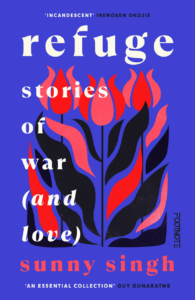Set against a variety of conflicts from the past century, author and academic Sunny Singh pays tribute to the courage and strength of victim-survivors of war, whose voices mostly go unheard because the victors control the narrative.
Some of the short stories in this moving and insightful collection are inevitably difficult to read, especially in terms of violence against women (although some female characters are also portrayed as murderers). However, in her author’s note, Singh explains the lengthy research and expert consultation, as well as her own psychological development, that was undertaken to avoid harm to those who suffered or continue to suffer.
The final message from the collection is not one of despair but one of hope.

One of the most affecting stories, “Tulips”, is a prime example of how such a topic can be handled. Lyndsey, an American veteran, gets preferential treatment at the florist because she has done “three tours in the damn sandpits”. What the florist doesn’t know is that Lyndsey was given a dishonourable discharge for her part in the horrific treatment of enemy prisoners. The unpleasant metaphor of stabbing tulips to make them stand upright, in a hidden spot under the flower base, enhances her cruelty. But Lyndsey is not a one-off monster. Singh shows that the abuse she has received has made her into one, a much more disturbing concept that also raises urgent questions about power, who has it and how they use it.
Other stories such as “Friday Morning Coffee” explore the abilities of individuals to overcome the most devastating of experiences. Nusreta loses both her husband and her best friend in the break-up of the former Yugoslavia. Subjected to a series of rapes by an enemy officer, she refuses to acquiesce with a series of small protests, including serving her rapist with the coffee he demands in a floral, feminine cup. Left pregnant by him, she nevertheless lovingly raises the child. As refugees in another country, Nusreta has the heart-rending realisation that death, not rape, is the worst thing that can happen to anyone, because it is “the living who choose which stories, memories and names are told to the children.”
Death also stalks the lives of the characters, a dread which is made more potent through the eyes of a child. In “Number-nine Bungalow”, to keep her father safe, Ruchi attempts to lock Death in an abandoned house, built by the British outside the hill station of Mussorie a century ago. The house reappears in the final story, “Amidst the Deodars”, as the refitted accommodation for a wounded veteran, Vir. Encountering ghosts from colonial times, Vir is also pestered by Ruchi who is trying to understand why her father survived and yet her teacher’s son was killed. Imprisoning Death in the house, she decides, worked for some but not others. “And it worked for you,” she tells Vir. “We know. Because Death keeps all his favourites here with him.”
The stories have only the minimum of description to anchor their location and time. This gives them a sense of universality and stresses that, while the background is interchangeable, the utter horror of armed conflict is the same. Equally, none of the stories would be out of place in a contemporary setting of Ukraine or Gaza. But, even in the deepest degradations depicted, author Singh shows that love can endure and renewal is possible. The final message from the collection is not one of despair but one of hope.


You must be logged in to post a comment.